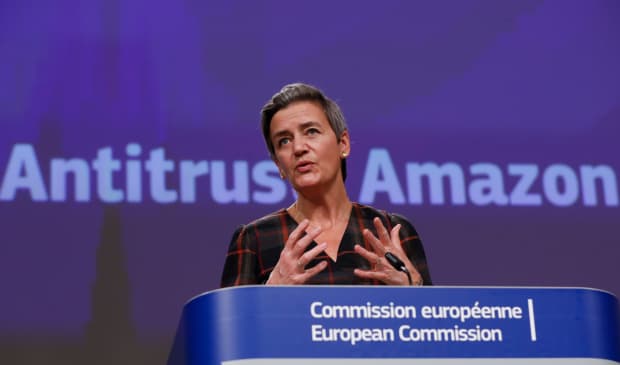This post was originally published on this site

European Commission Vice-President Margrethe Vestager.
POOL/AFP via Getty Images
The European Commission on Tuesday brought formal charges against Amazon for “illegally distorting competition” on the online retail market through its use of data on its platform’s independent sellers. The watchdog separately started a second probe into the online retail giant’s e-commerce practices.
- Margrethe Vestager, the Commission vice president who oversees the European Union’s competition watchdog, said in a press conference that the accumulation of data from 800,000 vendors on more than a billion items fed directly into Amazon AMZN, -2.81%’s algorithms and allowed the group to then focus on the bestselling items.
- The move comes after a nearly two-year formal probe on Amazon’s “dual role” as a platform for third-party vendors and seller of its own goods. Vestager noted that Amazon had abused its dominant position in Germany and France, Europe’s largest markets.
- The new probe will focus on Amazon’s “buy box” that pops up when customers are shopping on the internet, and its Prime service. European authorities suspect Amazon of giving a preferred treatment to the independent vendors using its logistics and delivery services to the detriment of others.
- Amazon said in a release, published as Vestager was speaking, that it “disagreed with the preliminary assertions” of the Commission. The company “represents less than 1% of the global retail market, and there are larger retailers in every country in which [it operates],” it added.
The outlook: Vestager, who had already slapped more than €8 billion of fines on Google GOOGL, -0.37%, is reinforcing her reputation as a tough competition enforcer, and the scourge of Big Tech. But Amazon is also the target of similar probes elsewhere, notably in the U.S., in California and the state of Washington.
The Commission’s decision, which was expected, will add to the online retailer’s woes in Europe. Amazon is already one of the big internet companies targeted by the governments of major European countries such as Germany, France and the U.K., for failing to pay taxes where it actually makes profit.
Once the company has presented its observations to the EU watchdog, it would have to comply with its demands after the unavoidable lawsuits have run their courses, and propose steps to comply with the Vestager’s demands.
If it persists, the group has ample means to pay another billion-euro fine. Its shares are up more than 60% this year, boosted by the rise of online sales due to the coronavirus pandemic. But the legal principle, and possible precedent, may be more important to the group than the actual amount of the fine it risks paying.
Oct. 2020: Why the EU is drawing up a ‘hit list’ of Big Tech players like Facebook and Google

